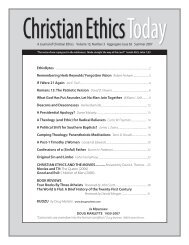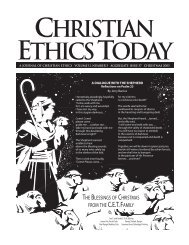Red-Letter Christians, An Emerging Evangelical Center, And Public ...
Red-Letter Christians, An Emerging Evangelical Center, And Public ...
Red-Letter Christians, An Emerging Evangelical Center, And Public ...
You also want an ePaper? Increase the reach of your titles
YUMPU automatically turns print PDFs into web optimized ePapers that Google loves.
CHRISTIAN ETHICS AND THE MOVIES<br />
Reviewed By David A. Thomas, Assoc. Prof. of Rhetoric, Emeritus, 1<br />
Reconciliation:<br />
The Kite Runner (2007)<br />
The Kite Runner is a beautiful<br />
modern fable of a man who had<br />
two sons. However, this familial relationship<br />
is not revealed until the end.<br />
This secret is not too hard to guess.<br />
It is a coming of age story about an<br />
Afghani boy, Amir, who strove futilely<br />
to please his father, Baba. The title<br />
refers to the children’s game of dueling<br />
with brilliantly colored kites over<br />
Kabul’s rooftops. The symbolic violence<br />
of fighting kites mirrors the<br />
emotional violence between the boys,<br />
and the stark war violence within<br />
Afghanistan.<br />
Only when Amir wins the annual<br />
kite flying tournament with a higher<br />
score than his father’s old record does<br />
Amir begin to feel a little confidence.<br />
Amir is an artistic child who likes<br />
to read and make up stories, but his<br />
father is disappointed with him mainly<br />
because he is so weak.<br />
The movie is based on a debut<br />
novel by Khaled Housseni, himself an<br />
Afghani immigrant in California who<br />
is now a doctor. It is said to be the<br />
first Afghan novel written in English.<br />
There are some strong autobiographical<br />
elements in the novel. The general<br />
outline of events corresponds to the<br />
author’s own life, including the asymmetrical<br />
relationship between the<br />
two boys. The Kite Runner is set in<br />
the contemporary miseries of transitional<br />
Afghanistan (part of the movie<br />
is sub-titled). The two boys, Amir and<br />
Hassan, grew up in pre-war Kabul<br />
almost like brothers, if you account<br />
for the rigid caste distinctions between<br />
them. Amir is the only son of Baba, a<br />
wealthy man. Hassan is the only son<br />
of Ali, Baba’s lifelong loyal family servant.<br />
Their extreme class differences is<br />
seen in the two boys’ relationship, but<br />
the story’s predominant motif is their<br />
close bond as friends.<br />
<br />
Neither boy has a mother who is<br />
present in this story. Amir’s mother<br />
is said to have died in childbirth.<br />
The first important female character<br />
to appear is the young woman Amir<br />
marries in America. The Kite Runner<br />
is a male quest story, all the way.<br />
The plot is divided into three main<br />
acts: (1) Amir’s childhood period up<br />
to the point when the Russian invasion<br />
of the country forces Baba and<br />
Amir to seek political asylum in<br />
America, and (2) Amir’s subsequent<br />
young manhood in San Jose, his marriage<br />
to an Afghani woman who was<br />
also a part of the diaspora, and his<br />
father Baba’s death, and (3) Amir’s<br />
return to Afghanistan on a climactic<br />
mercy mission to save the only son of<br />
his boyhood friend Hassan.<br />
In the first act, Amir’s story begins<br />
when he is twelve, and it unfolds<br />
through his close relationship with<br />
Hassan, the son of Ali, Baba’s longtime<br />
family servant. Because of the<br />
strict class difference that divided the<br />
two boys, their friendship was always<br />
constrained by Amir’s dominance and<br />
Hassan’s subservience. Things change<br />
when Amir wins the annual kite flying<br />
tournament.<br />
Hassan, the “kite runner” of the<br />
title, is off retrieving a fallen kite in<br />
an alleyway, but he runs into trouble.<br />
Some older bullies get little Hassan<br />
off alone and sexually assault him.<br />
Amir secretly witnesses the attack, but<br />
is too terrified to intervene. He never<br />
discloses to anyone that he was there,<br />
not even to Hassan. In the Middle<br />
Eastern moral universe, Hassan is<br />
not only tantamount to being Amir’s<br />
slave, he is now impure, defiled (and<br />
defined) by his misfortune of having<br />
been raped. 2 So the confused Amir<br />
bears the twin burdens of dealing with<br />
Hassan’s secret shame, and also his<br />
own guilt over his cowardice in not<br />
trying to protect Hassan, never telling<br />
anyone.<br />
Thereafter, Amir becomes a cruel<br />
playmate bent on humiliating Hassan.<br />
Amir continues to act out by contriving<br />
a plot to get rid of poor Hassan. He<br />
accuses Hassan of stealing his watch.<br />
Out of his fierce, unswerving loyalty<br />
to his friend, little Hassan admits to<br />
Amir’s dastardly lie, so as not to get his<br />
best friend into trouble with his father,<br />
Baba, for such treachery. Ali, the loyal<br />
family servant, feels he has no choice<br />
but to leave the beloved family and<br />
take his disgraced son Hassan with<br />
him. Baba forgives Hassan; but Ali<br />
apparently assumes Hassan’s admitted<br />
guilt, and does not accept the offer of<br />
grace.<br />
Then the Russians invade Kabul.<br />
Amir’s father is forced to flee with<br />
Amir for their lives. In the second<br />
act of the movie, they wind up in<br />
California, leaving Afghanistan—and<br />
Hassan—behind forever. Amir grows<br />
into a good man, living within an<br />
Afghani diaspora enclave in America.<br />
Even in their new humbled status,<br />
working in a gas station and in the flea<br />
markets, the older elitist generation<br />
still maintains their illusions of being<br />
superior to the Pashtun servant class<br />
they condescended to back home in<br />
Afghanistan.<br />
Amir remains haunted by the sin<br />
of his childhood betrayal of his best<br />
friend Hassan.<br />
In the last act, set in 2000, a close<br />
family friend, (Shaun Toub, previously<br />
seen in Crash) calls Amir from<br />
Pakistan to inform him that Hassan<br />
has died. Hassan has left a young<br />
son, Sohrab, as an orphan back in<br />
Afghanistan, now under Taliban control.<br />
Would Amir come to get Sohrab<br />
and take him to safety? This, he says,<br />
would be a good thing. Act III shows<br />
Amir’s dangerous rescue mission to<br />
find Sohrab and return him into the<br />
safety of Amir’s family. The phone call<br />
revealed the dark secret that Hassan<br />
was not really the son of Ali, Amir’s












